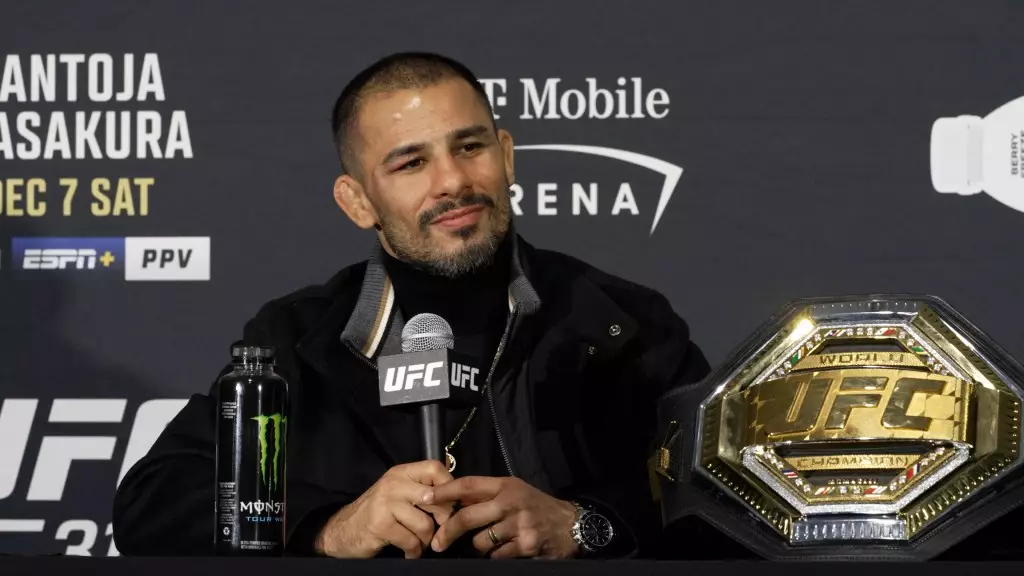In the world of Mixed Martial Arts (MMA), where legacies are crafted within the confines of an octagon and titles are often exchanged as swiftly as they are won, Alexandre Pantoja’s latest victory at UFC 310 has triggered a wave of discussion about the future of the flyweight division. Having secured a decisive win over Kai Asakura, Pantoja’s proclamation during the post-fight press conference raised eyebrows: “Like a GOAT.” For those unfamiliar with MMA parlance, “GOAT” stands for Greatest Of All Time, and it is fitting for Pantoja, who has demonstrated perseverance and skill throughout his career. As he seeks to carve out a more profound legacy, it begs the question: What defines a champion today?
Pantoja stands at a crossroads, where commercial success and sporting recognition often intertwine. His assertion that he has “cleaned the division” is a bold one, suggesting that he considers himself not only a contender but the top contender within a competitive landscape. As he challenges former champion Demetrious Johnson, it’s essential to analyze whether this aspiration is rooted more in personal ambition or a genuine desire to solidify the flyweight legacy.
The Value of Legacy Over Money
In today’s MMA culture, where lucrative contracts can overshadow sporting achievements, Pantoja’s stance serves as a refreshing reminder that not all fighters are in it solely for monetary gain. His assertion, “It’s not about the money,” reflects a growing sentiment among a new cohort of fighters who prioritize their legacy above lucrative contracts and sponsorships. Pantoja, in a world where financial incentives are progressively enticing, stands firm on one clear idea: true recognition comes from being acknowledged as one of the best, independent of financial gain.
His recent remarks serve as a critique of the priorities that have triumphed over the years in professional fighting. Fighters traditionally focused on financial rewards have inadvertently blurred the lines between passion for their craft and the pursuit of wealth. Pantoja’s desire to “prove myself” highlights a critical differentiation in motivation—he seeks validation through performance, a trait reminiscent of champions from previous generations who earned their titles through grit and resolve.
Pantoja’s challenges to Johnson exemplify not just a personal ambition, but also an underlying commentary about the shifting dynamics within the flyweight division. The landscape has evolved significantly since Johnson’s dominance – fighters from diverse backgrounds and regions have emerged, enriching the division. Pantoja’s recognition that he has faced competitors of various nationalities underscores the reality of a truly global competition, challenging the traditional notion of what it means to be a champion.
However, the response from Johnson indicates a complex relationship with competitive desire. His retirement at the age of 38 and reluctance to re-enter the octagon – regardless of financial incentives – raises important questions regarding legacy in a sport that often celebrates youth and vitality. Johnson’s dismissal of a $2 million offer signifies a separation from the pursuit of glory that once motivated him. As legacies evolve, Pantoja may need to consider that the road to defining his own greatness might also be fraught with unique hurdles and evolving philosophies within the sport.
While Pantoja’s ambition is commendable, the dynamics surrounding a potential matchup with Johnson are complicated. Johnson’s cryptic future and Pantoja’s eager desire intersect at a point of uncertainty. Will Johnson opt to return for one last fight to cement his own legacy, or is he content in his current trajectory? Pantoja must balance his vision of building a legacy against the realities of opponent availability and the machinations of promotional dynamics.
Ultimately, Pantoja’s path forward should be characterized by authenticity—embracing the warrior spirit that has brought him to this pinnacle while recognizing that the journey itself holds immeasurable value. The mixed martial arts landscape is shifting, and champions like Pantoja have the opportunity to redefine what it means to be ‘the best of the best.’ With every fight, strategy, and challenge presented, he inches closer to solidifying not just his legacy but elevating the entire flyweight division in the process.

